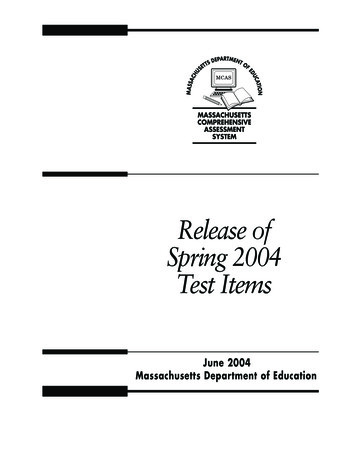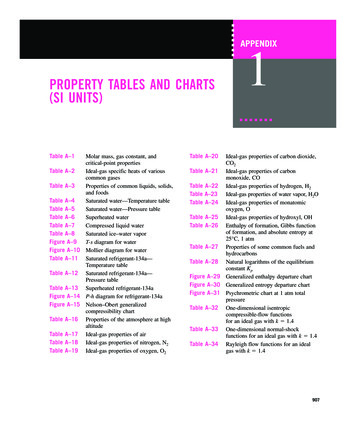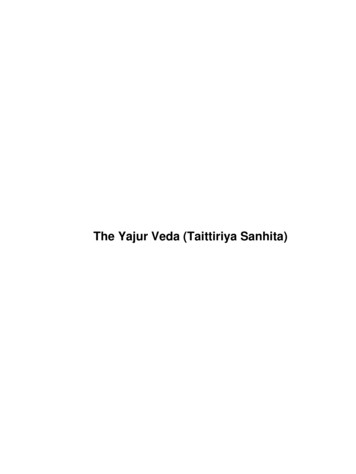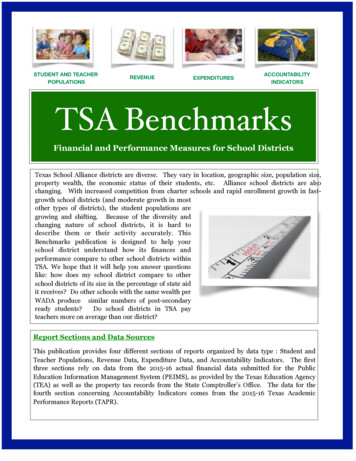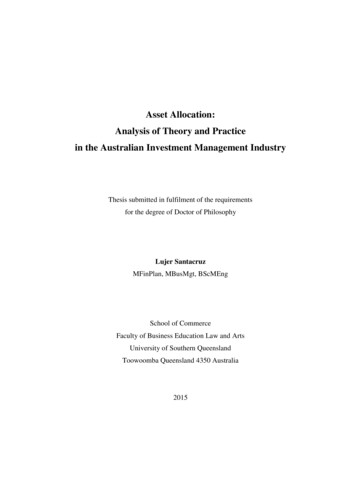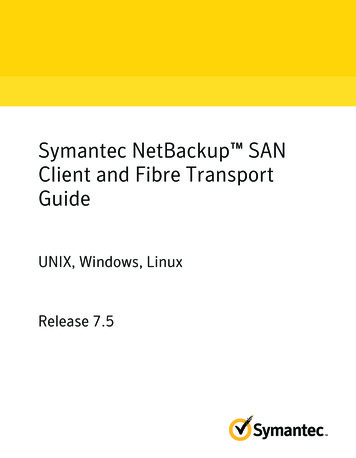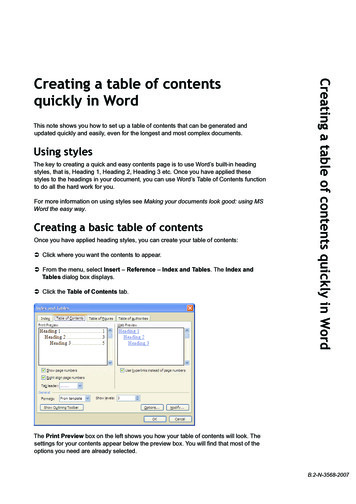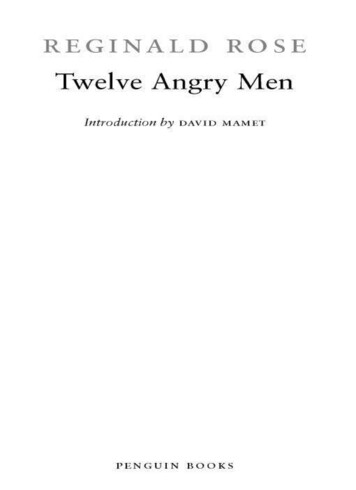
Transcription
Table of ContentsTitle PageCopyright PageIntroductionACT IACT IIFurniture and Property ListLighting PlotEffects PlotFOR THE BEST IN PAPERBACKS, LOOK FOR THE
TWELVE ANGRY MENREGINALD ROSE (1920-2002) was born and grew up in New York City. After PearlHarbor he enlisted, and served in the Philippines and Japan as a First Lieutenantuntil 1946. Writing since he was a teenager, he sold the first of his many televisionplays, The Bus to Nowhere, in 1950. He was called for jury duty for the first time in1954. It was a manslaughter case and the jury argued bitterly for eight hours beforebringing in a unanimous verdict. He decided this was a powerful situation on which tobase a television play, and wrote Twelve Angry Men as a live one-hour drama forCBS’s Studio One. Its impact led to the film version in 1957, and he received Oscarnominations for Best Screenplay and Best Picture (as coproducer). The stageversion was first produced in 1964, and revised versions in 1996 and 2004. In 1997it was filmed for Showtime.Other TV plays include The Remarkable Incident at Carson Corners, Thunder onSycamore Street, The Cruel Day, A Quiet Game of Cards, The Sacco-VanzettiStory, Black Monday, Dear Friends, Studs Lonigan, The Rules of Marriage, andthe award-winning Escape from Sobibor. Rose created, supervised, and wrote manyof the episodes of the TV series The Defenders (1961-1965). His films includeCrime in the Streets, Dino, Man of the West, The Man in the Net, Baxter!,Somebody Killed Her Husband, The Wild Geese, The Sea Wolves, and the filmversion of Whose Life Is It Anyway? He published Six Television Plays ; TheThomas Book, written for children; and a memoir, Undelivered Mail.Nominated six times, he won Emmys in 1954, 1962, and 1963. Among his manyawards are the Berlin Golden Bear (1957); Writers Guild of America awards,including the Lifetime Achievement Award; and three Mystery Writers of Americaawards.DAVID MAMET is the author of the plays Oleanna, Glengarry Glen Ross (1984Pulitzer Prize and the New York Drama Critics Circle Award), American Buffalo, ALife in the Theatre, Speed-the-Plow, Edmond, Lakeboat, The Water Engine, TheWoods, Sexual Perversity in Chicago, Reunion, The Cryptogram (1995 ObieAward), The Old Neighborhood, Boston Marriage, Dr. Faustus, and Romance. Histranslation and adaptations include Red River by Pierre Laville and The CherryOrchard, Three Sisters, and Uncle Vanya by Anton Chekhov. His films include, aswriter, The Postman Always Rings Twice, The Verdict, The Untouchables, Hoffa,The Edge, Wag the Dog, and The Winslow Boy; as writer/director, House ofGames, Oleanna, Homicide, The Spanish Prisoner, State and Main, Heist, and
Spartan. He is also the author of Warm and Cold and Bar Mitzvah, books forchildren with illustrations by Donald Sultan, and three other children’s books:Passover, The Duck and the Goat, and Henrietta; five volumes of essays: Writing inRestaurants, Some Freaks, The Cabin, Make-Believe Town, and Jaffsie and JohnHenry; two books of poems: The Hero Pony and Chinaman; Three Children’sPlays, On Directing Film, True and False, Three Uses of the Knife: On the Natureand Purpose of Drama, and the novels The Village, The Old Religion, and Wilson.Currently, he is cocreator of and executive producer for the CBS television seriesThe Unit, for which he also writes and directs.
PENGUIN BOOKSPublished by the Penguin GroupPenguin Group (USA) Inc.375 Hudson Street, New York, New York 10014, U.S.A.Penguin Group (Canada), 90 Eglinton Avenue East, Suite 700, Toronto,Ontario, Canada M4P 2Y3 (a division of Pearson Penguin Canada Inc.)Penguin Books Ltd, 80 Strand, London WC2R 0RL, EnglandPenguin Ireland, 25 St Stephen’s Green, Dublin 2, Ireland (a division of Penguin Books Ltd)Penguin Group (Australia), 250 Camberwell Road, Camberwell,Victoria 3124, Australia (a division of Pearson Australia Group Pty Ltd)Penguin Books India Pvt Ltd, 11 Community Centre, Panchsheel Park, New Delhi - 110 017, IndiaPenguin Group (NZ), cnr Airborne and Rosedale Roads, Albany,Auckland 1310, New Zealand (a division of Pearson New Zealand Ltd)Penguin Books (South Africa) (Pty) Ltd, 24 Sturdee Avenue,Rosebank, Johannesburg 2196, South AfricaPenguin Books Ltd, Registered Offices:80 Strand, London WC2R 0RL, EnglandFirst published in the United States of America by Dramatic Publishing Co. 1955This edition with an introduction by David Mamet published in Penguin Books 2006Copyright Reginald Rose, 1955, 1997Introduction copyright David Mamet, 2006All rights reservedLIBRARY OF CONGRESS CATALOGING IN PUBLICATION DATARose, Reginald.Twelve angry men / Reginald Rose ; introduced by David Mamet.p. cm.—(Penguin classics)eISBN : 978-1-440-60029-61. Legal drama, American. I. Title. II. Title: 12 angry men. III. Series.PS3535.O666T9 2006812’.54—dc22 2006046006The scanning, uploading and distribution of this book via the Internet or via any other meanswithout the permission of the publisher is illegal and punishable by law. Please purchase onlyauthorized electronic editions, and do not participate in or encourage electronic piracyof copyrighted materials. Your support of the author’s rights is appreciated.http://us.penguingroup.com
IntroductionOur greatest American Philosopher, to my mind, was Eric Hoffer.He was an immigrant kid. He never spent a day in school. He roamed the countryduring the Depression as a hobo and migrant worker. He wrote that some fellow fromthe Works Progress Administration rode into his hobo camp sometime in the thick ofthe Depression and said: “Who wants to work?” The volunteers were put on a flatbedtruck and hauled some miles up into the mountains in California.The WPA boss gave one man a compass and a map and said: “Build a road. Yourroad is to start here, and in three months I will meet you over there. Here are thespecs. Take the tools off the truck and get to work.”Hoffer wrote that that is just what they did. There was enough talent and know-howon the truck, he wrote, to’ve built not only that road, but to have built America. For that,he said, was quite exactly how America was built—a group of reasonably intelligentworkers took a simple plan, formed an ad-hoc group, and used their common senseand group spirit to execute it well.There are, I think, two Americas. There is that which we decry on reading thenewspapers. “Those fools,” we say, of the group not of our political bent, “how in theworld can they believe the nonsense they are spouting? How can intelligent peopleact that way?” This is the America of “them.”And then there is the America we participate in—that fairly friendly and reasonablegroup of diverse interests and talents, happy to pitch in, the America of “us.” We seeand participate in this group at the Little League, the Rotary, the Shul or Church, theblock party, the sports bar—we speak its language in the conversation we strike upwith the stranger in the airline departure lounge, in the chat with the other parents onthe way to school, in the office jokes we share. This nonabstract, this real America, isa rather pleasant place. When we are not being actively divided—by religion orpolitics—we rest here in the default position of unity. Over time, we see, thereasonable often find a way to unite the seemingly irreconcilable claims of passion.This process is the essence of our system of jurisprudence. The jury trial enshrinesour belief in and our experience that the multitude of the wise is the treasure of theland. Most people, I believe, initially shun jury duty. The summons always seems tocome at the least opportune time, and one might go kicking and screaming.Once empanelled on the jury, however, one is subsumed by what one realizes isthe essential component of American Democracy. On election day we vote, inwardlyor openly maligning the other half of our society, those idiots who will not see the light.In the jury room we are humbled by the realization that there is no one home but us.Here there are no hucksters, spending hundreds of millions on advertising, no stick
figures throwing their jackets over their shoulder and grinning at the camera just likenormal folks, no ginned-up controversies to enflame us against our neighbors.In the courtroom we see a poor man or woman—perhaps a criminal, perhaps avictim—caught in the awesome engine of the State, and we are told that, for theperiod of our service, we are the State.The lawyers can and will lie, elaborate, attempt to distract, embellish, and confuse;and nothing stands between the person in the box and the horror of an uncheckedgovernment except twelve diverse, reasonably intelligent people.The jurors have been wrenched from their daily lives, and made to swear a terribleoath. This oath is of such strength that it makes that taken in the marriage ceremonyseem—as indeed it may, sadly, generally prove—conditional.The Bible abounds with adjurations against perjury. A vast amount of the Book ofProverbs deals with the Lord’s horror of false witness. “Partiality in judging is notgood. He who says to the wicked ‘you are innocent’ will be cursed and abhorred.”“Witness not against your neighbor without cause,” “A false witness will not gounpunished,” “Do not favor the rich in judgment neither give preference to the poor.”Sitting in the jury box we console ourselves for the loss of time and income,thinking, “Before God, that could be me on trial. If that were so, God forbid, I wouldwant those in the jury to be as responsible as I pledge to be and as terrified of erroras I am.”The jury is that same group of individuals who can, through divisive words, becongealed into a mob; who can, through persuasion or art, form itself into anaudience. The audience suspends its disbelief in order to receive entertainment. As,curiously, does the mob—which is merely an audience enflamed, and moved by itsrighteous wrath, to crime. But the jury sets aside its prejudices, to aspire to thehighest state of humanity: the capacity to use reason to overcome animal passion.They are instructed to apply the standard of “reasonable doubt.” Each member will,of course, interpret this finally indefinable notion in his or her own way; and this is thegenius of the jury trial, that these idiosyncratic understandings and applications of thisabstract notion must each be defended to the group. The untutored, diverse groupmust then apply its own communal understanding of an abstract concept to a set ofdebatable facts and conflicting presentations, and arrive at a unanimous conclusion.Here the mega-state, outrageous in its multiplicity, absurd in the distance betweenmanufacturer and end-user, between politician and voter, between entertainer andaudience, is reduced to the size of a primitive clan.The drama this clan acts out is immemorial. The clan asks: “What shall we do withX?” And the elders reply: “Hold him here, while we retire and deliberate.”
The protagonist of a drama is caught in circumstances not of his own making.The hero of a tragedy discovers, at the play’s dénouement, that the affectivecircumstances he thought external to himself were actually brought into being by flawsin his own character.Tragedy is the more difficult form to write, as it is a closed system. The tragedymust resolve (both for the hero and for the viewer) in revelation that the answer wasbefore them all the time. This revelation, then, must be both surprising and inevitable.Any attempt by the author to mitigate the inevitable closed progression towardknowledge will weaken the tragedy. (The writer of the tragedy can not bring inconflicts and resolutions not brought into being by the hero’s character defects. Hecannot advance the plot by whim.)The writer of the drama, on the other hand, has a wide license. He or she mayintroduce, at will, external circumstances to beat the band: the hero may be assigneda physical illness, a rotten set of parents, the antagonist of an evil government oremployer, or a socially precarious status. As these states are not of the hero’s owndevice (they are merely assigned), the tools to be used in their vanquishment may bemore or less arbitrary.Similarly, the very setting of the drama may be used for convenient effect. (SetHamlet in a castle, a pawnshop, or a submarine, it’s the same play. The setting hasno dramatic weight.)Writers of the drama, on the other hand, may, to provide a catalyst, moor orabandon their protagonists in that space the very egress from which providesdramatic fodder. (The proverbial example being the group of snowbound travelersstuck in the inn or its equivalent, e.g., Bus Stop, The Petrified Forest, Dead End,Truckline Café , The Waters of the Moon, and, to stretch a point, The CherryOrchard.)These plays are all, generically, “gang dramas.”That is, formally, they do not differ from their (generally coeval) counterparts on thecomedy side, the films of the Marx Brothers. In the gang drama the protagonist orhero is split into many parts, each part (or character) standing for a different aspectof the hero’s consciousness.These warring factions (as the opposed factions of the consciousness in theindividual) must work from their initial irreconcilable positions, to find unity wherenone could have been suspected. (They may be aided in the struggle if “snowboundat an inn,” as they have conveniently been provided with “no way out.”) At the end ofthe gang drama, the individuals (the play and, thus, the audience) have seen unity
established and, so, are made more whole.In the bad version of this gang drama the audience is given the gift of a predictableending: “Black people are people, too,” “Gay people are people, too,” “HIV-positivepeople are people, too.” This foreseeable, universally accepted message is a sop tothe self-esteem of the audience, which has been deprived of the experience ofrevelation. Self-congratulation sends the audience out into the night in a state ofeuphoria that will not last past the end of the block. But the good drama (e.g., TwelveAngry Men) leaves the issue in doubt. It enmeshes the audience in the problems ofthe protagonists so that they may consider the arguments, now one, now the other,until, when hope is gone, persistence (of the author and of his or her creations) bringsrevelation, and the audience may leave the play surprised by the discovery of thepossibility of peace.
CastTwelve Angry Men was produced on Broadway by The Roundabout TheatreCompany: Todd Haimes, Ellen Richard, and Julia Levy. It opened at the AmericanAirlines Theatre on October 28, 2004, with the following cast:Directed by Scott EllisSet designed by Allen MoyerCostumes designed by Michael KrassLighting desing by Paul PalazzoSound design by Brian RonanOriginal compositions by John Gromada
Characters1ST JUROR (FOREMAN)2ND JUROR3RD JUROR4TH JUROR5TH JUROR6TH JUROR7TH JUROR8TH JUROR9TH JUROR10TH JUROR11TH JUROR12TH JURORGUARDJUDGE’S VOICESetting—The jury room of a New York Court of Law Time—1957
ACT IThe jury room of a New York Court of Law, 1957. A very hot summer afternoon.It is a large, drab, bare room in need of painting, with three windows in the back wallthrough which can be seen the New York skyline. Off the jury room is a washroomwith Washbasin, soap, and towels (visible on stage) and a lavatory beyond. Alarge, scarred table is center with twelve chairs around it. A bench stands againstthe wall and there are several extra chairs and a small table in the room, plus awatercooler, with paper cups and a wastebasket and an electric fan over the benchand a clock above the cooler and row of hooks for coats, with a shelf over it. Thereare pencils, pads, and ashtrays on the table. At night the room is lit by fluorescentlighting with the switch next to the door.When the CURTAIN rises, the room is empty. The voice of the JUDGE is heard.JUDGE’S VOICE . and that concludes the court’s explanation of the legal aspectsof this case. And now, gentlemen of the jury, I come to my final instruction to you.Murder in the first degree—premeditated homicide—is the most serious charge triedin our criminal courts. You’ve listened to the testimony and you’ve had the law read toyou and interpreted as it applies to this case. It now becomes your duty to try andseparate the facts from the fancy. One man is dead. The life of another is at stake. Iurge you to deliberate honestly and thoughtfully. If there is a reasonable doubt—thenyou must bring me a verdict of “not guilty.” If, however, there is no reasonable doubt—then you must, in good conscience, find the accused guilty. However you decide, yourverdict must be unanimous. In the event you find the accused guilty, the bench will notentertain a recommendation for mercy. The death sentence is mandatory in thiscase.The door opens and the GUARD enters. He carries a clipboard with a list of thejurors.I don’t envy you your job. You are faced with a grave responsibility. Thank you,gentlemen.There is a brief pause. Sound of JURORS walking, talking.GUARD: All right, let’s move along, gentlemen.The JURORS enter.
The GUARD checks his list.The 9TH JUROR, an old man, crosses, goes into the washroom, and exits to thelavatory.The 4TH JUROR begins to read a newspaper. Several JURORS open the windows.Others move awkwardly about the room. There is no conversation for a fewmoments. The 3RD JUROR takes out some notes and studies them. The 2NDJUROR crosses to the watercooler, and gets a cup of water. The FOREMAN tears asheet from a notepad and tears up little slips of paper for ballots. The GUARDcrosses to the 12TH JUROR and checks his name. The 7TH JUROR crosses to the4TH JUROR and offers him a stick of gum. The 4TH JUROR shakes his head.7TH JUROR [turning to the 8TH JUROR]: Do you want some gum?8TH JUROR [smiling]: No, thanks.The 7TH JUROR vigorously chews a piece of gum himself and crosses to the 6THJUROR.7TH JUROR [mopping his brow]: Y’know something? I phoned up for the weather.This is the hottest day of the year.The 6TH JUROR nods and gazes out of the window.You’d think they’d at least air-condition the place. I almost dropped dead in court.GUARD: OK, gentlemen. Everybody’s here. If there’s anything you want, I’m rightoutside. Just knock.The Guard exits and in the silence the sound is heard of the door being locked.5TH JUROR: I never knew they locked the door.10TH JUROR: Sure they lock the door. What’d you think?5TH JUROR: I don’t know. It just never occurred to me.The 10TH JUROR crosses and pauses beside the FOREMAN and indicates theslips of paper.10TH JUROR: Hey, what’s that for?FOREMAN: Well, I figured we might want to vote by ballots.10TH JUROR: Great idea! Maybe we can get him elected senator. [ He laughs untilhe begins to cough.]
The FOREMAN looks at his watch and compares it with the clock. The 3RD JURORtakes a cup of water from the watercooler, moves to the 2ND JUROR, and looksaround the room as he sips the water.3RD JUROR [to the 2ND JUROR]: How’d you like it?2ND JUROR [mildly]: I don’t know, it was pretty interesting.3RD JUROR: Yeah? I was falling asleep.2ND JUROR: I mean, I’ve never been on a jury before.3RD JUROR: Really? I’ve sat on juries, and it always amazes me the way theselawyers can talk, and talk and talk, even when the case is as obvious as this one. Imean, did you ever hear so much talk about nothing?2ND JUROR: Well, I guess they’re entitled.3RD JUROR: Sure they are. Everybody deserves a fair trial. That’s the system.Listen, I’m the last one to say anything against it, but I’m telling you sometimes I thinkwe’d be better off if we took these tough kids and slapped ’em down before theymake trouble, you know? Save us a lot of time and money.The 2ND JUROR looks nervously at the 3RD JUROR, nods, rises, moves to thewatercooler, refills his cup and stands alone, sipping.7TH JUROR [to the FOREMAN]: Hey, how about getting started here?3RD JUROR: Yeah, let’s get this over with. We’ve probably all got things to do.FOREMAN: Well, I was figuring we’d take a five-minute break. I mean, the old man’sin the bathroom . . .5TH JUROR [to the FOREMAN, hesitantly]: Are we going to sit in order?FOREMAN: I don’t know.The 8TH JUROR is looking out the window.12TH JUROR [to the 8TH JUROR]: Not a bad view.The 8TH JUROR nods.What d’you think of the case?The 8TH JUROR doesn’t answer.It had a lot of interest for me. No dead spots—know what I mean? I’ll tell you we werelucky to get a murder case. I figured us for a burglary or an assault or something.
Those can be the dullest. [He looks out of the window.] Say, isn’t that the Woolworthbuilding?8TH JUROR: That’s right.12TH JUROR: Funny, I’ve lived here all my life and I’ve never been in it.The 8TH JUROR gazes out of the window. The 12TH JUROR looks at him for amoment then moves away.7TH JUROR [to the 10TH JUROR]: Goddamn waste of time. [He laughs.]10TH JUROR: Yeah, can you imagine, sitting there for three days just for this?7TH JUROR: And what about that business with the knife? I mean, asking grown-uppeople to believe that kind of bullshit.10TH JUROR: Well, look, you’ve gotta expect that. You know what you’re dealingwith.7TH JUROR: Yeah, I suppose so.The 10TH JUROR blows his nose vigorously.What’s the matter, you got a cold?10TH JUROR: And how. These hot weather colds can kill you. I can hardly touch mynose. Know what I mean? [He blows his nose loudly.]7TH JUROR: Well, your horn’s all right. Now try your lights. [He climbs on to thebench and tries the fan.] Oh, that’s beautiful, the fan doesn’t work. [He steps down.]Somebody take a letter to the mayor. “Dear Stingy . . .”FOREMAN [about the fan]: Let me take a look at it.The 3RD JUROR moves above the 4TH JUROR, leans over and scans the 4THJUROR’s newspaper. The FOREMAN climbs on the bench and examines the fan.It doesn’t work. [He climbs down.]3RD JUROR [to the 4TH JUROR]: I didn’t get a chance to look at the newspaperstoday. Anything new going on?4TH JUROR: I was just wondering how the market closed.3RD JUROR: I wouldn’t know. Say, are you on the Exchange or something?4TH JUROR: I’m a broker.
3RD JUROR: Really? I run a messenger service. “The Beck and Call Company.” Thename’s my wife’s idea. I employ thirty-seven people. . . . Started with nothing.7TH JUROR [looking at his watch]: Hey, Mr. Foreman, let’s go. What d’you say?FOREMAN: All right, gentlemen. Let’s take seats.7TH JUROR [to the 2ND JUROR]: This better be fast. I got tickets to a ball gametonight. Yankees—Cleveland. We got this new kid pitching, Modjelewski, or whateverhis name is. He’s a bull, this kid. [He shoots his hand forward and out to indicate thepath of a curve ball.] Shhooooom. A real jug handle. There is no reaction at all fromthe 2ND JUROR.You’re quite a ball fan, aren’t you? [ He turns to the FOREMAN.] Where do you wantus to sit?FOREMAN: Well, I was thinking we ought to sit in order, by jury numbers. [ He pointswith each number.] Two, three, four, and so on, if that’s OK with you gentlemen?10TH JUROR: What’s the difference?4TH JUROR: I think it’s reasonable to sit according to number.10TH JUROR [rising]: Let it be. [He moves and sits on chair 10.] The JURORSbegin to take their seats. The 8TH JUROR continues to stare out of the window. The9TH JUROR is still in the lavatory.12TH JUROR [to the 11TH JUROR]: What was your impression of the prosecutingattorney?11TH JUROR [with a German accent]: I beg pardon?12TH JUROR: I thought he was really sharp. I mean, the way he hammered home hispoints, one by one, in logical sequence. It takes a good brain to do that. I was veryimpressed.11TH JUROR: Yes, I think he did an expert job.12TH JUROR: I mean, he had a lot of drive, too. Real drive.7TH JUROR: OK, let’s get this show on the road.FOREMAN [to the 8TH JUROR]: How about sitting down?The 8TH JUROR does not hear the FOREMAN.The gentleman at the window.
The 8TH JUROR turns, startled.How about sitting down?8TH JUROR: Oh, I’m sorry. [He moves to his chair and sits.]The 9TH JUROR enters the washroom from the lavatory and washes his hands.10TH JUROR [across the table to the 4TH JUROR]: It’s pretty tough to figure, isn’t it?A kid kills his father. Bing! Just like that.12TH JUROR: Well, if you analyze the figures . . .10TH JUROR: What figures? It’s those people! I’m tellin’ you they let the kids run wildup there. Well, maybe it serves ’em right. Know what I mean?The FOREMAN crosses to the washroom door.7TH JUROR [to the 5TH JUROR]: Hey, you a Yankee fan?5TH JUROR: No. Milwaukee.7TH JUROR: Milwaukee! That’s like being hit on the head with a crowbar once a day.Listen, who they got—I’m asking you, who they got besides great groundskeepers?FOREMAN [to the 9TH JUROR]: We’d like to get started.The 9TH JUROR enters from the washroom.9TH JUROR: I’m sorry.The 9TH JUROR crosses and takes his seat.7TH JUROR: Milwaukee!FOREMAN: All right. Now you gentlemen can handle this any way you want to. Imean, I’m not going to have any rules. If we want to discuss first and then vote, that’sone way. Or we can vote right now to see how we stand. [ He pauses and looksaround.] Well, that’s all I have to say.4TH JUROR: I think it’s customary to take a preliminary vote.7TH JUROR: Yeah, let’s vote. Who knows, maybe we can all go home.FOREMAN: It’s up to you. Just let’s remember we’ve got a first degree murdercharge here. If we vote “guilty,” we send the accused to the electric chair. That’smandatory.4TH JUROR: I think we all know that.
3RD JUROR: Come on, let’s vote.10TH JUROR: Yeah, let’s see who’s where.FOREMAN: Anybody doesn’t want to vote? [He looks around.] The others are silent.All right. This has to be a twelve-to-nothing vote either way. That’s the law. OK, arewe ready? All those voting “guilty” raise your hands.Seven or eight hands go up immediately. Several others go up more slowly.Everyone looks around the table as the FOREMAN rises and begins to counthands. The 9TH JUROR’s hand goes up now, and all hands are raised except the8TH JUROR’s. . . . Nine—ten—eleven. That’s eleven for “guilty.” OK. “Not guilty”?The 8TH JUROR slowly raises his hand.One. Right. OK, eleven to one—“guilty.” Now we know where we are. [ He resumeshis seat.]10TH JUROR: Boy-oh-boy! There’s always one.7TH JUROR [after a pause]: So, what do we do now?8TH JUROR: Well, I guess we talk.10TH JUROR: Boy-oh-boy!3RD JUROR [leaning over toward the 8TH JUROR]: Well, look, do you really thinkhe’s innocent?8TH JUROR: I don’t know.3RD JUROR: I mean, let’s be reasonable. You sat in court and heard the same thingswe did. The man’s a dangerous killer. You could see it.8TH JUROR: The man! He’s sixteen years old.3RD JUROR: Well, that’s old enough. He knifed his own father. Four inches into thechest.6TH JUROR [to the 8TH JUROR]: It’s pretty obvious. I mean, I was convinced fromthe first day.3RD JUROR: Well, who wasn’t? [To the 8TH JUROR.] I really think this is one ofthose open and shut things. They proved it a dozen different ways. Would you like meto list them for you?8TH JUROR: No.
10TH JUROR: Then what do you want?8TH JUROR: Nothing. I just want to talk.7TH JUROR: Well, what’s there to talk about? Eleven men here agree. Nobody hadto think twice about it, except you.10TH JUROR: I want to ask you something. Do you believe his story?8TH JUROR: I don’t know whether I believe it or not. Maybe I don’t.7TH JUROR: So what’d you vote “not guilty” for?8TH JUROR: There were eleven votes for “guilty.” It’s not easy for me to raise myhand and send a boy off to die without talking about it first.7TH JUROR: Who says it’s easy for me?8TH JUROR: No one.7TH JUROR: What, just because I voted fast? I think the guy’s guilty. You couldn’tchange my mind if you talked for a hundred years.8TH JUROR: I’m not trying to change your mind. It’s just that we’re talking aboutsomebody’s life here. I mean, we can’t decide in five minutes. Suppose we’rewrong?7TH JUROR: Suppose we’re wrong! Suppose this whole building fell on my head.You can suppose anything.8TH JUROR: That’s right.7TH JUROR [after a pause]: What’s the difference how long it takes? We honestlythink he’s guilty. So suppose we finish in five minutes? So what?8TH JUROR: Let’s take an hour. The ball game doesn’t start till eight o’clock.7TH JUROR [smiling]: OK, slugger, be my guest. There is a silence.FOREMAN [hesitantly]: Well, who’s got something to say?He looks at the 2ND JUROR.How about you?2ND JUROR: Not me.9TH JUROR: I’m willing to put in an hour.10TH JUROR: Great. I heard a pretty good story last night. This woman comes
running into the doctor’s office, stripped to the waist—8TH JUROR: That’s not what we’re sitting here for.10TH JUROR: All right, then you tell me. What are we sitting here for?8TH JUROR: Maybe for no reason. I don’t know. Look, this boy’s been kicked aroundall his life. You know—living in a slum, his mother dead since he was nine. He spent ayear and a half in an orphanage while his father served a jail term for forgery. That’snot a very good head start. He’s had a pretty terrible sixteen years. I think maybe weowe him a few words. That’s all.10TH JUROR: I don’t mind telling you this, mister. We don’t owe him a thing. He got afair trial, didn’t he? What d’you think the trial cost? He’s lucky he got it. Know what Imean? [He rises and looks around at the others.] Look, we’re all grown-ups here.We heard the facts, didn’t we? Now, you’re not going to tell us that we’re supposed tobelieve that kid, knowing what he is. Listen, I’ve lived among ’em all my life. You can’tbelieve a word they say. I mean, they’re born liars.9TH JUROR: It suddenly occurs to me that you must be an ignorant man.10TH JUROR: What do you mean? What’s he talking about?9TH JUROR: Do you think you have a monopoly on the truth?10TH JUROR: What are you making a Federal Case out of it for? [To the others.]How d’ya like this guy?9TH JUROR [to the others]: I think certain things should be pointed out to this man.3RD JUROR: All right. It’s not Sunday. We don’t need a sermon in here.10TH JUROR: Monopoly! For Chrissakes.The 9TH JUROR half rises but then feels the 8TH JUROR’s hand firmly on his arm,gently pulling h
Crime in the Streets, Dino, Man of the West, The Man in the Net, Baxter!, Somebody Killed Her Husband, The Wild Geese, The Sea Wolves, and the film version of Whose Life Is It Anyway? He published Six Television Plays; The Thomas Book, written for children; and a memoir, Undelivered Mail. Nominated six times, he won Emmys in 1954, 1962, and 1963.

